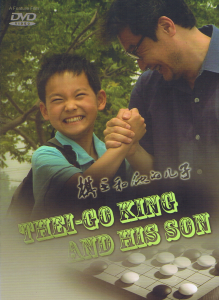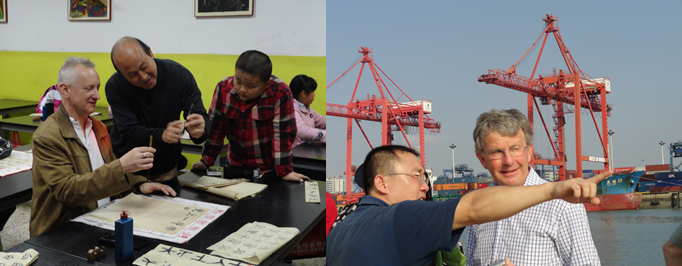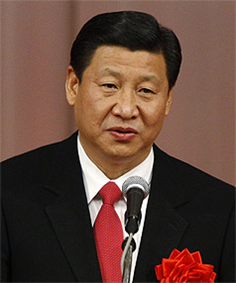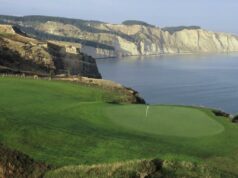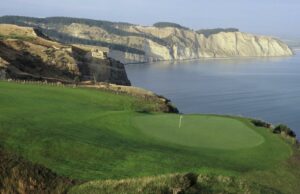NEXT MEETING:
DVD – “The I-Go King and his Son”
Liu Yishou, who his friends call the Go King, is unemployed and when his fed-up wife leaves him, their son, Xiao Chuan, wants to stay with his dad. Unexpectedly, Liu Yishou discovers that his son has a great talent for Go (Weiqi) and vows to support him in developing his gift for the game. They confront many challenges, but with courage, persistence and great love they achieve success.
Director: Zhou Wei
Starring: Sun Song, Wang Chengyang
In Chinese with English subtitles
95 minutes
Date: 4 May 2012
Time: 7.30pm
Where: Hastings District Council Chambers in Lyndon Road.
LAST MEETING:
Heiko Lade, with support from Sally Russell, shared their experiences on the 2011 Prominent Persons’ and Society Leaders’ Delegation to Beijing and Shandong and Fujian Provinces. We gained a real insight into aspects of China today off the usual tourist track.
Above left: Heiko learning calligraphy strokes. Above right: Andrew Turnbull, Director, Port of Timaru, at Xiamen Port, one of the top 20 container ports in the world.
Left: Beijing traffic Right: Zhong De Environmental Co. designs and manufactures large scale waste incinerators, providing electricity, clean emissions and waste ‘concrete’ blocks. It is listed on the German stock exchange with a Euro 1.3 million profit last quarter.
Annual Subscriptions:
We have a draw of three prizes to members who pay by June 30th
so pay NOW and be in to win.
Please pay by cheque or direct debit (see details on the subscription form)
- $20 grocery voucher from Janet Kee and the Hong Ke Long Chinese Mini Mart, 13 Morris Spence Avenue, Napier; Phone: 842 2116
- An acupuncture session or a massage with Heiko Lade.
- A Chinese scroll
Go (Weiqi) Team from China visits Hawke’s Bay
A high ranking Go (Weiqi) team from China attended a New Zealand Go Tournament in Wellington over Easter to celebrate 40 years of diplomatic relations. They travelled to Hawke’s Bay for exhibition matches on Monday 9th April.
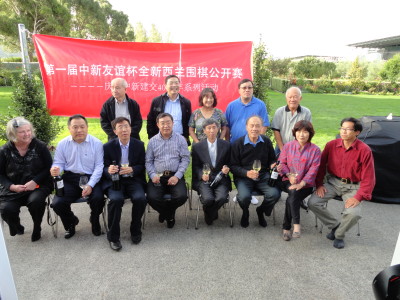
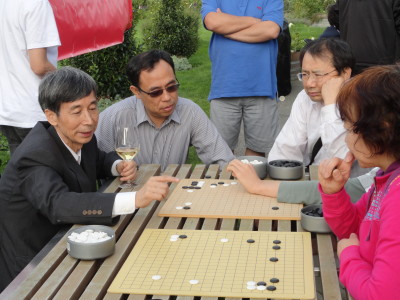
Go (Weiqi) is an ancient board game for two players that originated in China more than 2,000 years ago. The game is noted for being rich in strategy despite its relatively simple rules and is played by two players who alternately place black and white stones on the vacant intersections of a grid of 19×19 lines. The object of the game is to use one’s stones to surround a larger portion of the board than the opponent. Once placed on the board, stones can only be moved if they are captured. When a game concludes, the controlled points (territory) are counted along with captured stones to determine who has more points. By the 3rd Century BC it was already a popular pastime, with a reference to the game in the Analects of Confucius.
e-Cosway shop opens in Napier
 eCosway (launched in 2002) is a rapidly growing international company based in Kuala Lumpur, Malaysia with over 2,000 outlets in our region. Janet Kee opened the 13th shop in New Zealand on 7th April in the Ocean Boulevard, Napier.
eCosway (launched in 2002) is a rapidly growing international company based in Kuala Lumpur, Malaysia with over 2,000 outlets in our region. Janet Kee opened the 13th shop in New Zealand on 7th April in the Ocean Boulevard, Napier.
From left: Pastor Kee, their son Nim Kee, Manager, Napier Mayor Barbara Arnott and Janet Kee.
The new face of China: Political bargaining and jockeying has begun as China prepares to elect new leaders. (by Yongwook Ryu)
In the autumn of 2012 the 18th Party Congress will convene in Beijing and elect the new leaders of China (PRC).
Although attention will be fixated on Xi Jinping and whether he will assume the top party and military positions, the leadership change in PRC is more than the change of the top person. It is the change of the oligarchs who collectively run the Politburo Standing Committee (PSC), the nation’s de facto highest decision-making body. Who will likely be the next group of China’s leaders? What will it mean for China’s future especially in its relations with the external world?
The process of leadership change in the PRC is a complex and opaque one with political bargaining and jockeying between different factions and leaders. In principle, it is a bottom-up process, with the election of 2270 delegates this year from 40 delegations to the Party Congress, which then elects the CCP Central Committee consisting of approximately 350 members. The Central Committee then elects the members of the Politburo (currently 25 members), which in turn chooses the PSC members (currently 9 members).
However, the process is in fact top-down, with party leaders exerting significant influence on the selection of delegates or members at all levels, from the Party Congress to the PSC. As in all past Party congressional gatherings, this years will also see a major turnover of personnel. Approximately 60 per cent of the members of the Central Committee will likely be new members.
More importantly, based on the age restriction, seven of the nine current members of the PSC will step down, including Hu Jintao and Wen Jiabao, and an additional seven Politburo members are expected to retire from their positions. If other Politburo members retire for reasons such as health, or are removed for political wrongdoings, the magnitude of turnover will be even greater.
There are several factors that are important in predicting who will become the next leaders of the PRC. The first is age. The 17th Congress set a precedent that anyone who reaches the age of 68 will have to retire, and this ‘rule’ will likely be followed at the 18th Congress. The second factor is administrative experience and proven record of success, an element of meritocracy in the otherwise authoritarian system.
The PSC oversees all major policy issues, from foreign and military affairs, legislative affairs, ideology and propaganda, internal security, party discipline, party apparatus, and matters relating to Taiwan, Hong Kong, and Macao. Hence those candidates with relevant administrative experience in these established policy sectors, such as Liu Yunshan, Propaganda Department chief, and Meng Jianzhu, State Councillor for internal security, would have a good chance of making it into the PSC.
Perhaps the most important factor is patron-client relations and factional balance. The outgoing party leaders will seek to appoint candidates who are closer to them so that they can continue to exert influence after they retire from their official duties. People like Zhang Gaoli and Ling Jihua have a good chance of being in the next PSC, precisely because they are protégés of Jiang Zemin and Hu Jintao, respectively.
Despite a large change in the composition of the PSC, Hu Jintao is likely to retain the top military post in the Central Military Commission for several more years, following Jiang Zemin’s precedent. In addition, surprises could happen. Although Xi Jinping appears to have secured his position as the next top leader—his recent visit to the United States supports this—as the recent Bo Xilai saga illustrates, the fortunes of potential candidates can change very quickly and unexpectedly.
The composition of the PSC will have a significant impact on the ideological emphasis and policy direction of China in the coming years. While all leaders agree on the CCP’s one-party rule, communist ideology, economic growth and Taiwan, there are some important differences of emphasis between the Hu Jintao-led tuan pai faction and the ‘princelings’. The former’s priority is on social justice, equality and political reform such as the eradication of corruption and promotion of democratic processes. In contrast, the latter emphasises fast economic growth led by coastal cities, market liberalisation, the reform of the state-owned enterprises, and urbanisation.
On Taiwan, with the re-election of Ma Ying-jeou earlier this year, the new leadership of the PRC will continue to deepen the cross-strait relations, and hence we are likely to see a period of relative stability. On relations with United States and other regional nations, China will feel more confident in voicing its opinions and protecting its interests. This trend has more to do with the shifting power balance in the region than leadership change in the PRC, but the new leaders, lacking revolutionary credentials and charisma, might find themselves increasingly attracted to growing nationalism as a source of their political legitimacy.
Yongwook Ryu is a research fellow, Department of International Relations, School of Political & International Studies, the Australian National University.
April 2012 issue of “Asian Currents” from the Asian Studies Association of Australia is now available from the ASAA web site at http://www.asaa.asn.au/publications/ac/2012/asian-currents-12-04.pdf


